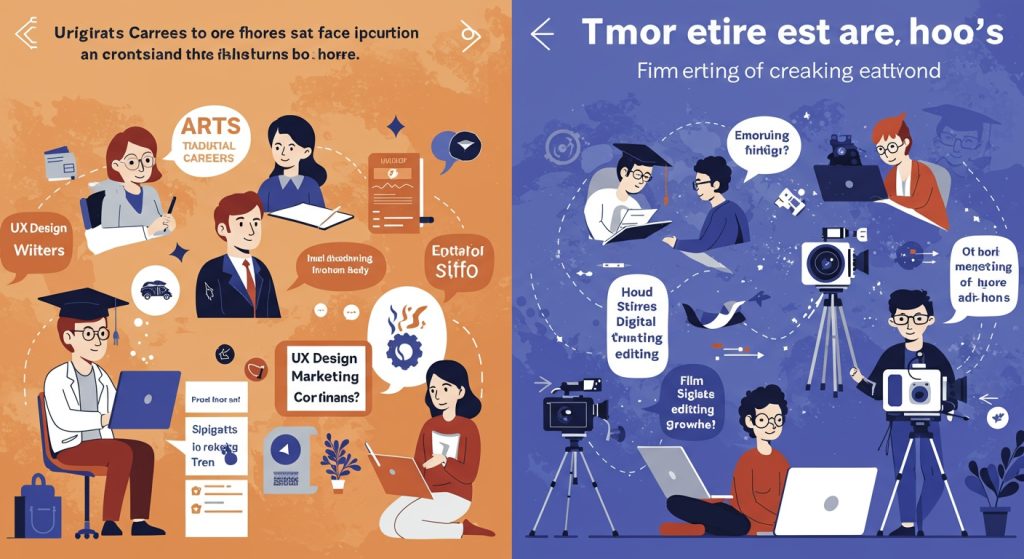A BSc in Statistics opens doors to a data-driven world, far beyond simple number crunching. We’re in the era of Big Data, where companies crave professionals who can transform raw details into actionable insights. The program itself builds a solid foundation in probability, statistical modeling. Data analysis techniques using tools like R and Python. But what specific careers can you pursue with this degree? From predicting consumer behavior as a Marketing Analyst using regression models to mitigating financial risk as an Actuary employing survival analysis, the possibilities are vast. This exploration highlights diverse career paths, showcasing how a statistical skillset translates into real-world impact across various industries.

Decoding Statistics: More Than Just Numbers
So, you’ve earned your BSc in Statistics. Congratulations! But amidst the celebrations, the big question looms: what’s next? A statistics degree opens doors to a surprisingly diverse range of career paths. It’s no longer just about crunching numbers in a back room. Today, statisticians are in demand across various industries, helping organizations make data-driven decisions.
Before diving into specific career paths, let’s quickly define what Statistics actually is. At its core, statistics is the science of collecting, analyzing, interpreting. Presenting data. It’s about extracting meaningful insights from raw data to inform decision-making. This involves a variety of techniques, including:
- Descriptive Statistics: Summarizing and describing the main features of a dataset (e. G. , mean, median, mode, standard deviation).
- Inferential Statistics: Drawing conclusions about a population based on a sample of data. This often involves hypothesis testing and confidence intervals.
- Regression Analysis: Examining the relationship between variables to predict future outcomes.
- Experimental Design: Planning experiments to collect data that can be used to answer specific research questions.
- Probability Theory: The foundation for many statistical methods, dealing with the likelihood of events occurring.
The Data Scientist: Unveiling Insights in the Digital Age
One of the most popular and rapidly growing career paths for statistics graduates is that of a Data Scientist. Data Scientists are essentially storytellers with data. They use their statistical knowledge, programming skills. Domain expertise to extract valuable insights from large and complex datasets. They are skilled in communicating complex findings to non-technical audiences.
Key Responsibilities of a Data Scientist:
- Collecting and cleaning data from various sources.
- Exploring and analyzing data to identify patterns and trends.
- Developing and implementing machine learning models.
- Communicating findings to stakeholders through visualizations and presentations.
- Working with cross-functional teams to solve business problems.
Skills Required:
- Strong statistical foundation.
- Proficiency in programming languages like Python and R.
- Experience with machine learning algorithms.
- Data visualization skills (e. G. , Tableau, Power BI).
- Excellent communication and problem-solving skills.
Actuarial Science: Predicting the Future of Risk
Actuaries are experts in assessing and managing risk. They use statistical models to predict future events, such as mortality rates, accident probabilities. Natural disasters. This insights is crucial for insurance companies, pension funds. Other organizations that need to manage risk effectively.
Key Responsibilities of an Actuary:
- Developing and applying statistical models to assess risk.
- Pricing insurance policies and calculating premiums.
- Evaluating the financial health of insurance companies and pension funds.
- Communicating risk assessments to stakeholders.
Skills Required:
- Strong statistical and mathematical skills.
- Knowledge of financial principles.
- Problem-solving and analytical skills.
- Communication and presentation skills.
The Actuarial Exams: Becoming a fully qualified actuary requires passing a series of rigorous exams administered by professional actuarial organizations. These exams cover a wide range of topics, including probability, statistics, financial mathematics. Actuarial modeling. Passing these exams demonstrates a high level of expertise and commitment to the profession. This is a popular option for those seeking career guidance.
Biostatistics: Improving Health Through Data
Biostatistics, also known as biometrics, is the application of statistical methods to biological and health-related research. Biostatisticians play a vital role in designing clinical trials, analyzing medical data. Developing new treatments and therapies. They work closely with doctors, researchers. Other healthcare professionals to improve patient outcomes.
Key Responsibilities of a Biostatistician:
- Designing and analyzing clinical trials.
- Developing statistical models to interpret disease patterns.
- Evaluating the effectiveness of new treatments and therapies.
- Collaborating with researchers to interpret study results.
Skills Required:
- Strong statistical knowledge.
- Understanding of biological and medical principles.
- Experience with statistical software packages (e. G. , SAS, R).
- Communication and collaboration skills.
Real-World Application: Consider the development of a new drug. Biostatisticians are involved in every stage, from designing the clinical trials to analyzing the data to determine if the drug is safe and effective. Their work is crucial in ensuring that new treatments are based on sound scientific evidence.
Statistical Consulting: Providing Expertise to Diverse Clients
Statistical consultants provide statistical expertise to clients in a variety of industries. They help organizations design studies, examine data. Interpret results. This can be a highly rewarding career path for those who enjoy problem-solving and working with different types of data.
Key Responsibilities of a Statistical Consultant:
- Consulting with clients to comprehend their research questions and data needs.
- Developing statistical analysis plans.
- Analyzing data and interpreting results.
- Preparing reports and presentations for clients.
Skills Required:
- Strong statistical knowledge.
- Excellent communication and interpersonal skills.
- Ability to explain complex concepts to non-technical audiences.
- Experience with a variety of statistical software packages.
Types of Consulting Roles: You can work as an internal statistical consultant within a large organization or as an external consultant for a consulting firm. Internal consultants typically work on projects within their own organization, while external consultants work with a variety of clients across different industries.
Quantitative Analyst (Quant): Applying Statistics to Finance
Quantitative analysts, often called “quants,” use statistical models to review financial markets and develop trading strategies. They work for investment banks, hedge funds. Other financial institutions. This is a highly demanding but also highly lucrative career path.
Key Responsibilities of a Quant:
- Developing and implementing statistical models for pricing derivatives.
- Analyzing market data to identify trading opportunities.
- Managing risk and developing hedging strategies.
Skills Required:
- Strong statistical and mathematical skills.
- Knowledge of financial markets.
- Proficiency in programming languages like Python and C++.
- Problem-solving and analytical skills.
The Role of Stochastic Calculus: Quants often use stochastic calculus, a branch of mathematics that deals with random processes, to model the behavior of financial markets. Understanding stochastic calculus is essential for developing sophisticated trading strategies.
Market Research Analyst: Understanding Consumer Behavior
Market research analysts use statistical methods to comprehend consumer behavior and market trends. They help companies make informed decisions about product development, marketing. Pricing.
Key Responsibilities of a Market Research Analyst:
- Designing and conducting surveys and focus groups.
- Analyzing data to identify consumer preferences.
- Developing reports and presentations on market trends.
Skills Required:
- Strong statistical knowledge.
- Understanding of marketing principles.
- Experience with survey design and analysis.
- Communication and presentation skills.
Use Case: A company wants to launch a new product. A market research analyst would conduct surveys and focus groups to comprehend consumer demand for the product, identify the target market. Determine the optimal pricing strategy. This data would then be used to develop a marketing plan and launch the product successfully.
Government Statistician: Serving the Public Good
Government statisticians collect and assess data to inform public policy decisions. They work for government agencies at the local, state. Federal levels. This is a rewarding career path for those who want to use their statistical skills to serve the public good. The career guidance here is that you will be able to provide valuable insights for policy making.
Key Responsibilities of a Government Statistician:
- Collecting and analyzing data on a variety of topics, such as population, employment, health. Education.
- Developing statistical reports and publications.
- Providing statistical advice to policymakers.
Skills Required:
- Strong statistical knowledge.
- Understanding of government policies and programs.
- Experience with statistical software packages.
- Communication and presentation skills.
Examples of Government Agencies: Examples include the Bureau of Labor Statistics (BLS), the Census Bureau. The National Center for Health Statistics (NCHS). These agencies collect and examine data on a wide range of topics, providing valuable details to policymakers and the public.
Comparing Career Paths: A Quick Overview
| Career Path | Key Skills | Industry | Salary Range (Approximate) |
|---|---|---|---|
| Data Scientist | Statistics, Programming, Machine Learning, Communication | Tech, Finance, Healthcare, Retail | $90,000 – $150,000+ |
| Actuary | Statistics, Mathematics, Finance, Risk Management | Insurance, Finance | $80,000 – $200,000+ |
| Biostatistician | Statistics, Biology, Medicine, Clinical Trials | Healthcare, Pharmaceuticals | $70,000 – $130,000+ |
| Statistical Consultant | Statistics, Communication, Problem-Solving | Various Industries | $60,000 – $120,000+ |
| Quantitative Analyst | Statistics, Mathematics, Finance, Programming | Finance | $100,000 – $250,000+ |
| Market Research Analyst | Statistics, Marketing, Survey Design | Marketing, Advertising | $50,000 – $90,000+ |
| Government Statistician | Statistics, Public Policy | Government | $60,000 – $110,000+ |
Note: Salary ranges are approximate and can vary depending on experience, location. Employer.
Essential Skills to Enhance Your Employability
While a BSc in Statistics provides a solid foundation, developing additional skills can significantly enhance your employability and career prospects. Here are some key areas to focus on:
- Programming Skills: Proficiency in programming languages like Python and R is essential for data analysis and machine learning.
- Data Visualization: The ability to create compelling visualizations is crucial for communicating insights to stakeholders.
- Machine Learning: Understanding machine learning algorithms and techniques is increasingly crucial for data scientists.
- Communication Skills: Strong communication skills are essential for explaining complex statistical concepts to non-technical audiences.
- Domain Expertise: Developing expertise in a specific industry, such as healthcare or finance, can make you a more valuable asset to employers.
Online Resources: There are numerous online resources available to help you develop these skills, including online courses, tutorials. Coding bootcamps.
Conclusion
Let’s think of your BSc in Statistics not just as a degree. As a launchpad. We’ve explored diverse paths, from data science to actuarial roles, highlighting the demand for statistical skills across industries. The key takeaway is adaptability; the ability to learn new tools and techniques is paramount in today’s rapidly evolving data landscape. My personal advice? Don’t shy away from exploring niche areas like biostatistics or econometrics. These specializations can open doors to unique opportunities and higher earning potential. A common pitfall is focusing solely on theoretical knowledge. Supplement your studies with practical projects and internships to build a strong portfolio. Remember, best practice involves continuous learning, staying updated with the latest statistical software and methodologies. Embrace the challenge. You’ll find your statistical expertise in high demand. The field needs innovative thinkers like you.
More Articles
Top Computer Science Courses for AI and Machine Learning in 2025
Future Salary Trends: What Will Be the Highest Paying Jobs?
Top 5 Computer Science Courses for Cybersecurity Professionals in 2025
Best Material Science Courses: Focus on Sustainable Material Development for 2025
FAQs
So, I’m thinking about a BSc in Statistics… What kind of jobs am I actually qualified for?
That’s the big question, right? A BSc in Statistics opens a surprising number of doors. Think beyond just crunching numbers (although you’ll do some of that!). You’re looking at roles like Data Analyst, Statistician (obviously!), Market Research Analyst, Actuary (with further exams). Even Biostatistician if you’re interested in health sciences. The key is your ability to comprehend and interpret data, which is valuable everywhere.
Data Analyst and Statistician… Aren’t those the same thing?
Good question! There’s definitely overlap. Here’s the gist: Statisticians often focus on developing new statistical methods and theories. They might work on more complex research projects. Data Analysts, on the other hand, are usually more focused on applying existing statistical techniques to solve specific business problems. So, think of the Statistician as the method-maker and the Data Analyst as the method-applier. They both need strong statistical skills.
What’s the deal with being an Actuary? I’ve heard it’s tough.
You heard right! Actuaries assess financial risks, usually for insurance companies or pension funds. It’s definitely a math-heavy field. You’ll need to pass a series of rigorous exams to become fully qualified. But the payoff is a very rewarding and well-compensated career. Your BSc in Statistics is a fantastic starting point, giving you a solid foundation for the actuarial exams.
Okay. What if I’m not a huge fan of finance or insurance? Are there other options?
Absolutely! Don’t worry, you’re not locked into spreadsheets forever. Your skills are valuable in areas like healthcare (Biostatistics, analyzing clinical trial data), government (analyzing social trends, predicting economic patterns), sports analytics (predicting player performance). Even environmental science (modeling climate change impacts). , any field that collects data needs people who can make sense of it.
What kind of skills, besides the obvious math stuff, will help me stand out?
Beyond the stats themselves, communication is HUGE. You need to be able to explain your findings to people who aren’t statisticians. Knowing programming languages like R or Python is also a massive advantage, as it lets you automate tasks and work with larger datasets. Finally, strong problem-solving skills are key – you’ll need to be able to identify the right statistical approach to answer a given question.
Will I need to go to grad school to get a good job with a stats degree?
Not necessarily! A BSc in Statistics can definitely land you a great entry-level job, especially in roles like Data Analyst. But, if you want to move into more advanced roles or specialize in a particular area (like Biostatistics), a Master’s degree can be a big boost. It really depends on your career goals.
What does ‘Market Research Analyst’ actually do?
They’re the people who figure out what consumers want! They design surveys, review data on consumer behavior. Help companies comprehend their target market. They use statistical techniques to identify trends and patterns, which then inform marketing and product development decisions. So, if you’re curious about what makes people tick and how businesses can better serve them, this could be a cool path for you.



